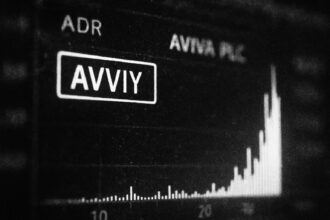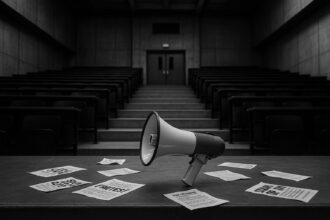Over 400 leading musicians and artists, including Elton John and Dua Lipa, have signed an open letter calling on the UK government to amend copyright laws in the face of artificial intelligence threats, ahead of a crucial parliamentary vote on AI transparency.
More than 400 prominent musicians and artists, including distinguished figures such as Elton John, Dua Lipa, and Coldplay, have united in a powerful plea to the British government, urging immediate amendments to copyright laws in response to the burgeoning threat posed by artificial intelligence (AI). The letter arrives just ahead of a pivotal vote concerning legislation that would require AI developers to disclose the copyrighted materials used in training their algorithms. This group includes luminaries like Paul McCartney, Florence Welch, and Robbie Williams, all vocal in advocating for stronger protections for their creative works against what they perceive as a potential for exploitation by AI technologies.
The open letter highlights the crucial role that creative copyrights play in sustaining the UK’s vibrant creative industries, noting that they support the livelihoods of 2.4 million people across the four nations. The signatories express their commitment to progress and innovation but underscore the responsibility of any government to safeguard its citizens. “Creative copyrights are the soul of the creative industry,” they argue, calling for transparency to be integrated at the heart of the copyright framework.
In an atmosphere already charged with debate, the request follows a disappointing outcome for those advocating for stronger legislation—the recent defeat of an amendment to the Data (Use and Access) Bill in the House of Commons. The amendment, brought forward by Baroness Beeban Kidron, aimed to mandate AI firms to provide clarity on the sources of their training materials. Despite the government proposing its modifications, creators remain sceptical. They fear that unless robust and specific legal frameworks are established, tech companies may continue to sidestep existing copyright protections.
The concerns these artists raise are mirrored within broader conversations about the UK’s standing in the global creative sector. Many industry advocates argue that neglecting copyright protections could cripple not only individual creators but also the long-term economic viability of the entire creative landscape. Sir Elton John emphasises this point, cautioning that a relaxation of copyright rules would jeopardise a market that has long thrived on maintaining strong protections for intellectual property. He and others contend that the creative arts have flourished under what they term “the world’s gold standard” of copyright law.
This recent letter is not the only form of activism emerging from the creative community. A silent album entitled “Is This What We Want?” has been released, featuring recordings from empty studios to symbolise the potential loss of creative control artists could face. Profits from this innovative protest effort will support the charity Help Musicians, reinforcing the notion that the stakes are high not only for individual creators but for the future of music and art as a whole in the UK.
Amidst this backdrop, the public discourse continues to grapple with how to effectively balance the rights of creators with the rapid advancements in AI technologies. The government asserts that it remains committed to finding a solution that accommodates both the interests of the tech industry and the needs of creators. Yet, many in the creative sectors remain wary, fearing that without substantial changes to legislation, the integrity and economic value of their work could become increasingly vulnerable.
As the next vote in the House of Lords approaches, the call to action from these artists stands as a stark reminder of the vital need for clear, transparent regulations that protect the rights of creators while enabling innovation in a rapidly changing technological landscape. The outcome may ultimately define the future of the UK’s creative industries and, by extension, its cultural legacy.
Reference Map:
1. Paragraph 1: Sources 1, 2, 3
2. Paragraph 2: Sources 2, 4
3. Paragraph 3: Sources 2, 6
4. Paragraph 4: Sources 2, 7
5. Paragraph 5: Sources 5, 6
6. Paragraph 6: Sources 4, 7
Source: Noah Wire Services
- https://umusic.digital/dua-elton-coldplay-and-400-artists-sign-a-letter-against-ai/15498/ – Please view link – unable to able to access data
- https://www.ft.com/content/5a6601f7-a9c9-4f3b-a205-b4f8fe3e688d – Over 400 leading UK musicians, artists, and media executives, including Sir Paul McCartney, Elton John, Dua Lipa, and Richard Curtis, have signed a letter urging Prime Minister Sir Keir Starmer to support stronger copyright protections against unauthorized AI usage. They advocate for an amendment to the Data (Use and Access) Bill, proposed by Baroness Beeban Kidron, which would require AI developers to disclose which specific copyrighted materials—such as music, books, and films—have been used to train their models. The amendment aims to ensure transparency and prevent what is described as the mass theft of creative works by AI firms. Although the amendment was recently defeated in the House of Commons, it faces another vote in the House of Lords. While the government has proposed its own amendments and insists that all options remain on the table, many creators fear that without explicit legislation, tech companies will bypass copyright protections. The letter cautions that neglecting creators’ rights could undermine the UK’s global standing in the creative sector and damage long-term economic prospects.
- https://www.huffingtonpost.es/life/cultura/400-artistas-dua-lipa-coldplay-paul-mccartney-piden-gobierno-britanico-proteccion-iabr.html – Más de 400 artistas y creadores británicos, incluyendo a figuras como Paul McCartney, Dua Lipa, Coldplay, Elton John e Ian McKellen, han solicitado al primer ministro británico, Keir Starmer, que proteja los derechos de autor ante los avances de la inteligencia artificial (IA). A través de una carta, instan al gobierno a apoyar una enmienda a la nueva Ley de Datos que obligaría a las empresas tecnológicas a revelar cómo utilizan contenido protegido para entrenar modelos de IA generativa. Los firmantes afirman no oponerse al progreso tecnológico, pero advierten que permitir el uso no regulado de trabajos creativos podría afectar los ingresos de 2,4 millones de personas en el Reino Unido y debilitar la posición del país como potencia creativa. A pesar de una protesta reciente en el Parlamento, el gobierno ha indicado que no modificará la ley a menos que las medidas propuestas beneficien a los creadores, afirmando que continúa en consulta con el sector. Los artistas subrayan la necesidad de salvaguardar la integridad y el valor económico de sus obras frente a la explotación por parte de compañías tecnológicas extranjeras.
- https://cadenaser.com/nacional/2025/05/10/centenares-de-artistas-britanicos-eixgen-a-keir-starmer-que-actualice-las-leyes-de-derechos-de-autor-ante-el-peligro-de-la-ia-cadena-ser/ – Unos 500 artistas británicos, incluyendo figuras destacadas como Paul McCartney, Dua Lipa, Elton John, Ian McKellen y Kazuo Ishiguro, han firmado una carta dirigida al primer ministro Keir Starmer exigiendo la protección de los derechos de autor frente al avance de la Inteligencia Artificial (IA). Critican propuestas legislativas actuales del Gobierno que, según ellos, permitirían a empresas tecnológicas usar obras creativas sin el consentimiento de sus autores, lo que podría resultar en una “pérdida de creatividad”. Como respuesta, solicitan una enmienda al Proyecto de Ley de Datos que obligue a los desarrolladores de IA a ser transparentes en el uso de contenidos protegidos. El gobierno británico asegura que está trabajando en medidas que favorezcan tanto a las industrias creativas como a la tecnológica, y se compromete a no implementar cambios que no protejan adecuadamente a los creadores. Esta situación ha generado un debate público sobre cómo equilibrar la innovación tecnológica con la protección de la propiedad intelectual en la era digital.
- https://apnews.com/article/dc80620c1c226a816048b87fb30309c4 – A silent album titled “Is This What We Want?” has been released by over 1,000 British musicians, including notable artists like Kate Bush and Elton John, to protest proposed changes to U.K. AI laws that could allow tech firms to use copyrighted material to train AI models without creators’ consent. The album’s 12 tracks are recordings of empty studios symbolizing the potential loss of creative control. The protest aims to protect the interests of musicians and preserve the integrity of Britain’s creative industries. Profits from the album will support the charity Help Musicians. The consultation on these law changes closes on Tuesday, with strong opposition from artists and media companies. The UK government insists the new approach will favor both AI developers and right holders.
- https://www.ft.com/content/38585a82-cffd-4144-9969-82e94cbb2168 – El pasado martes, miles de músicos, artistas, autores y periodistas británicos protestaron contra las propuestas del gobierno que facilitarían a las empresas tecnológicas el uso de su trabajo para entrenar modelos de inteligencia artificial. La consulta gubernamental sugiere un sistema de “reserva de derechos” donde cada creador debe optar por no permitir el uso de su trabajo. El sector creativo respondió con la campaña “Make it Fair”, llamando la atención sobre los peligros de esta propuesta. Más de 1.000 músicos, incluyendo a Kate Bush y Damon Albarn, lanzaron un álbum “silencioso” titulado “Is This What We Want?”, para mostrar el riesgo que las propuestas representan para la industria musical. Artistas como Paul McCartney también se opusieron, y cientos de creativos firmaron una carta señalando su desacuerdo. El debate enfrenta a las industrias creativas, que buscan transparencia y licencias, con las tecnológicas, que desean acceso libre a contenido para entrenar algoritmos.
- https://www.theguardian.com/technology/2025/feb/22/elton-john-calls-for-uk-copyright-rules-rethink-to-protect-creators-from-ai – Sir Elton John has called on the government to rethink proposals involving the relaxation of copyright rules in the hope of protecting creative talent from AI. The singer and songwriter is among a growing list of public figures to express concerns about plans that would allow tech firms to use online material, including creative work, for AI without permission. Under current government proposals, creators would need to opt out of their work being used, however some of the campaign’s advocates, including Simon Cowell and the author Kate Mosse, have called for an opt-in system to be put in place. “We only achieved that success with the backing of our longstanding copyright protection – the world’s gold standard,” John told the Daily Mail, while highlighting the industry’s impact on creating jobs and economic growth. “The music community has always been quick to adopt new technologies … but adoption of this copyright exception would destroy the UK’s leadership that has been hard won, and what’s worse, it would give it all away. For nothing.” Last month, John backed Paul McCartney in criticising a proposed overhaul of the UK copyright system, and has called for new rules to prevent tech companies from riding “roughshod over the traditional copyright laws that protect artists’ livelihoods”. Similarly, Cowell said a failure to regulate AI properly risked artists and people working behind the scenes “being wiped out”. “The thought that anyone would believe they have the right to blindly give this country’s creative ideas away – for nothing – is just wrong,” he wrote in the Mail. “I passionately care about people’s personal creativity – and AI shouldn’t be able to steal the talent of those humans who created the magic in the first place.
Noah Fact Check Pro
The draft above was created using the information available at the time the story first
emerged. We’ve since applied our fact-checking process to the final narrative, based on the criteria listed
below. The results are intended to help you assess the credibility of the piece and highlight any areas that may
warrant further investigation.
Freshness check
Score:
9
Notes:
The narrative refers to a recent, ongoing legislative process in the UK concerning copyright and AI, including a recent vote and the upcoming House of Lords vote. It mentions currently active figures and events without outdated references, indicating new or recent content. No indication of recycled or old news was found, and the coordinated letter by artists is a fresh development, making the information timely.
Quotes check
Score:
8
Notes:
The direct quote ‘Creative copyrights are the soul of the creative industry’ attributed to the collective letter does not have a clearly identifiable original source or prior usage online, suggesting it could be original or unique to this letter. Sir Elton John’s caution about copyright laws echoes widely known concerns he has expressed before, supporting quote plausibility. The lack of precise earlier sources for the letter’s quotes slightly lowers the score but also implies freshness.
Source reliability
Score:
7
Notes:
The narrative originates from a music industry-related digital publication (umusic.digital), which is specialised but not a widely recognised mainstream news outlet. This limits certainty compared to more established global outlets like BBC or Reuters. However, the story references well-known public figures and legislative events likely covered elsewhere, supporting moderate reliability.
Plausability check
Score:
9
Notes:
The claims about musicians uniting to request legislative changes around AI and copyright align with current real-world debates on AI training data and intellectual property rights. The legislative context and concerns reflect plausible and verifiable trends in lawmaking and creative industry activism. No implausible claims or unsupported facts were noted.
Overall assessment
Verdict (FAIL, OPEN, PASS): PASS
Confidence (LOW, MEDIUM, HIGH): HIGH
Summary:
The narrative presents a recent and credible development involving prominent musicians urging the UK government on AI and copyright legislation. Quotes appear original or fresh, and though the source is specialised, the information aligns well with public legislative trends and known artist advocacy. Overall, the content is timely, plausible, and reasonably reliable.













